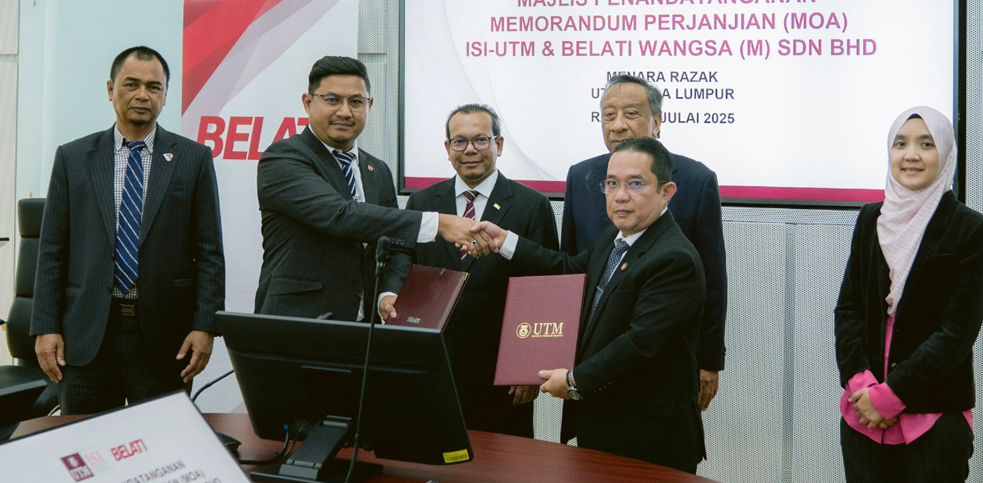Kuala Lumpur, 16 July 2025 (Wednesday) – Institut Sultan Iskandar ISI-UTM has joined forces with Belati Wangsa (M) Sdn Bhd, on a pioneering mission to transform Reclaimed Asphalt Pavement (RAP), which consists of waste materials obtained from the milling process of pavement surfaces. The project is a game-changing technology set to revolutionise sustainable materials in road construction and maintenance, focusing more on providing ways to reduce virgin materials, energy and waste in construction without compromising the quality of the pavement of road construction and maintenance.
With the increasing cost of road maintenance in the last five years, valued at RM4 billion annually in Malaysia, the demand for sustainable, cost-effective and durable road pavement is rapidly growing.
Commenting on the collaboration, Professor Dr Mohd Shafry bin Mohd Rahim, Universiti Teknologi Malaysia (UTM) Vice Chancellor said “Sustainable Road maintenance is an exciting growth in construction industry. Reclaimed asphalt pavement (RAP) has received wide application in asphalt pavement construction and maintenance and it has shown cost-effectiveness over virgin hot mix asphalt (HMA).
AEncik Mohamad Akmal bin Johari, Director of Belati Wangsa (M) Sdn. Bhd. said: “We are delighted to collaborate with UTM researchers to develop a sustainable and promising pavement maintenance technology with minimal use of natural resources and limited material transportation, offering broad application potential. This effort will reduce greenhouse gas (GHG) emissions in road maintenance operations while supporting carbon-neutral initiatives in the Malaysian construction industry.
As a company with vast experience in road maintenance, we hold a strong sense of social responsibility to explore and develop innovative, high-impact technological solutions that prioritise quality, enhance public well-being, and deliver meaningful returns to the government. This initiative reflects Belati Wangsa’s unwavering commitment to quality, sustainability, and excellence in supporting Malaysia’s road infrastructure development.”
Road maintenance works are experiencing major challenges in terms of business model, technological innovation and sustainable practices. Sustainability practices in road construction and maintenance focuses in providing ways on how to reduce virgin materials, energy and waste in construction, without compromising the quality of the pfocus onterials. As such, there are many factors contributing to the sustainable construction such as construction methods, design processes, machineries and materials used for the construction.
Associate Professor Dr Sarajul Fikri Mohamed, UTM Project Leader and construction economics expert, said, “From a whole life cycle costing (WLCC) perspective, sustainable reclaimed asphalt pavement (RAP) benefits are only a part of the total economic and environmental impacts. The WLCC, in this study, refers to a structured methodology to quantify and compare the cash flow during the lifecycle of a pavement from cradle to grave. The cash flow may not only occur in the production and transportation phases of the pavement materials but also in the construction, maintenance, use, and end-of-life recycling phases of pavements.
UTM, through researchers from the Construction Economic, Law and Policy (CELP) Faculty of Built Environment and Surveying and the Pavement and Transportation Research Group (PTRG) Faculty of Civil Engineering, contributes expertise in the development of road engineering innovations using milling waste and the development of a comprehensive life cycle cost model in road engineering work using locally developed material innovations and technology in collaboration with Belati Wangsa (M) Sdn Bhd. The research product currently being developed will be jointly patented between UTM and Belati Wangsa (M) Sdn Bhd.
***


